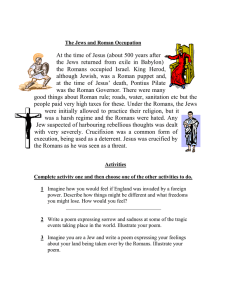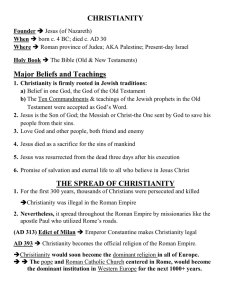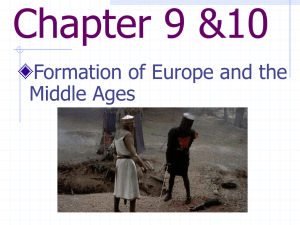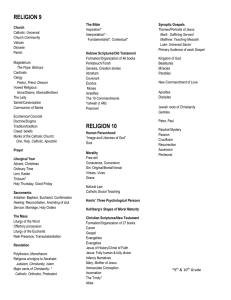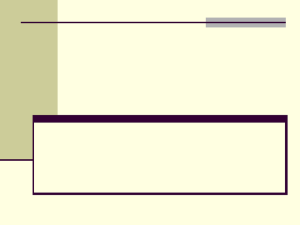Judeo-Christian Tradition CA World History Standard 10.1
advertisement
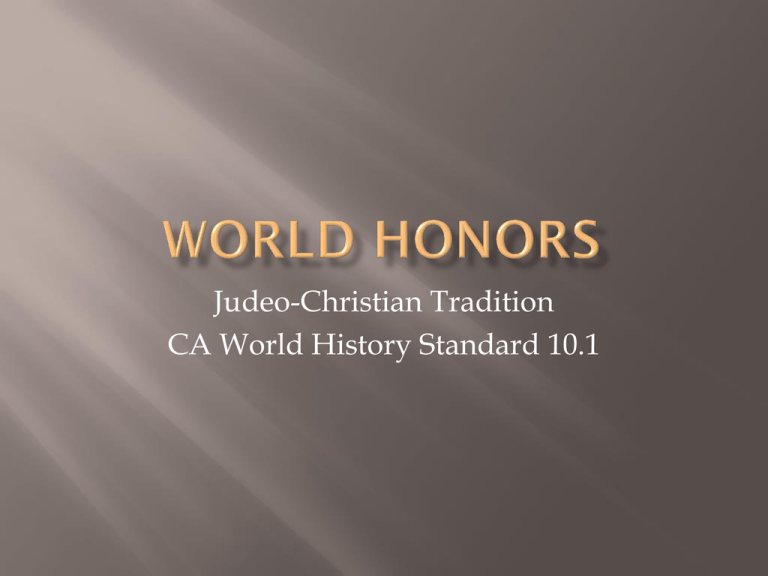
Judeo-Christian Tradition CA World History Standard 10.1 Rome is in Italy Roman Empire ruled most of Europe as well as territory in Asia and North Africa. Borrowed heavily from the Greeks. The combined ideals of the Greeks and Romans are known as the Greco-Roman tradition. Greco-Roman Tradition placed an emphasis on rule of law. These shared ideals spread throughout the Roman Empire and mad a lasting impression. To make laws known to everybody Romans posted their laws in public on the 12 Tables. As their empire expanded, Roman system of law spread. Many of their laws and practices are in use throughout the world today. Veto—one branch of govt. can check or block a law made by another branch. Senate—name of Roman legislature and is name of one of the 2 houses in the U.S. legislature. Who was the Greek who gave a famous speech on the importance of civic duty in a democracy? A = Pericles The Greeks are considered to be the first people to practice which form of government? A = democracy Why did Plato distrust direct democracy? A = voted to kill his teacher Socrates. What form of government did Plato prefer? A = Republic (representative dem.) What was the term Plato used for the ideal leader who was chosen by the people because of his talent (rather than getting his position on inheritance)? A = Philosopher King Aristotle’s belief that laws should apply to everybody (even rulers) is called? A = rule of law. The shared beliefs and customs of the Greeks and Romans are called what? A = Greco-Roman Tradition. How did the Romans make their laws known to the public? The 12 Tables. What are two things in the U.S. constitution that came originally from the Romans? A = veto and the Senate. Religion of the ancient Israelites People also referred to as Hebrews Considered the first monotheistic religion According to the Bible, God made a covenant (agreement) with Abraham. It was: 1. God had chosen to have a special relationship with the Jews (thus they are the “Chosen People”). 2. Jews were to worship and obey God alone 3. God, in turn, would provide the land of Canaan (the “Promised Land”) as place for the Jews to live. Book of Exodus tells how Moses led the Jews out of Egyptian slavery to the “Promised Land” of Canaan. During this 40-year journey, God gave Moses the Ten Commandments. Set of laws that are the basis of Judeo-Christian Beliefs. 1st four stress religious duties (such as keeping the Sabbath). Other six address conduct towards others (“Thou shall not kill” or “Steal,” etc.) Personal morality = All people need to practice ethical behavior. Social Justice = Rich and powerful should protect poor and weak. ALL PEOPLE ARE EQUAL BEFORE GOD. Everybody—even leaders—must obey laws. Judaism is considered to be the first religion to do what? A= worship one god (monotheism). Jews believe they are all descendants of whom? A = Abraham What is the deal the Jews have with God called? A = Covenant. How did God tell the Jews the rules he wanted them to follow? A = 10 commandments. What are the basic tenets of Judaism? A = ethical behavior and everybody is equal before God. Ancient Jews believed that God would send a Messiah (savior) to deliver peace and freedom . When the Jews were being ruled by the Romans, a man named Jesus of Nazareth claimed to be the Messiah. A.k.a. Jesus Christ Founder of Christianity Born to a humble Jewish family Taught sincerity of belief, rather than strict observance of religious laws, was what mattered most. Very popular amongst the poor. Claimed to be the Messiah. Said that he was the “son of God.” Jesus angered conservative Jewish leaders because he questioned tradition and their authority. Jesus angered the Roman authorities because he was a threat to their rule. Pontius Pilate, the Roman governor of Jerusalem, arrested Jesus. Jesus was found guilty of blasphemy and treason and sentenced to death by crucifixion. According to the gospels, Jesus rose from the dead and told his apostles to spread his teachings. 1st person to spread the word of Jesus to nonJews. Paul is the person most responsible for spreading Christianity throughout the Roman Empire. At first, Christians were oppressed by the Romans. Over time, though, Christianity was tolerated within the empire (Edict of Milan) The emperor Theodosius eventually made Christianity the official religion of the Roman Empire. Christianity developed from Judaism (Jesus was a Jew!) The Christian Bible is a combination of the Jewish Bible (the Old Testament) and the stories of the life and teachings of Jesus (the New Testament). The shared beliefs and customs of the two religions are referred to as the Judeo-Christian Tradition. The main belief being that all people are equal under God and that all people need to practice proper ethical and moral conduct. After the fall of the Roman Empire, the Christian Church eventually split as well (1054). The Eastern Orthodox Church became the church of Christianity in the Middle East and Eastern Europe. The Catholic Church (centered in Rome) became the church of Christianity in Western Europe. The Catholic clergy (church officials) consisted of the following hierarchy: A. Pope B. Bishops C. Priests. People began to become disenchanted with the Catholic Church during the 1400s. Main Reasons: a. Church sold offices. b. Selling of indulgences. c. Unholy lives of church officials. On the whole, the Catholic church seemed most concerned with money and power. German Priest Criticized corrupt practices of the Catholic Church. Said “faith” was all that was needed to get to heaven. What were some of the criticisms of the Catholic Church? Who was the main figure in publically criticizing the corruption in the Catholic Church? A = Martin Luther 1517 in Wittenburg, Germany Luther posts a list of 95 criticisms (theses) of the Catholic Church. Luther is kicked out of the Catholic Church. Many people form churches based on Luther’s ideas. These new Christian churches are called Protestant Churches. Protestant Reformation = reforming churches. Takes place in northern Europe. John Calvin—Swiss Church Reformer. Shared many ideas with Luther. But believed in Predestination Predestination=God has already decided who is going to heaven. Proof Read! Use past tense when writing about the past. Avoid vague pronouns. Plato did not like democracy. He thought people shouldn’t be allowed to vote for all of the laws because they are uneducated. Plato thought it should be a republic.

